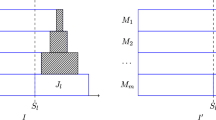Abstract
In this paper we study variants of the non-preemptive parallel job scheduling problem where the number of machines is polynomially bounded in the number of jobs. For this problem we show that a schedule with length at most (1 + ε)OPT can be calculated in polynomial time, which is the best possible result (in the sense of approximation ratio), since the problem is strongly NP-hard.
For the case when all jobs must be allotted to a subset of machines with consecutive indices a schedule with length at most (1.5 + ε)OPT can be calculated in polynomial time. The previously best known results are algorithms with absolute approximation ratio 2.
Research supported by a PPP funding “Approximation algorithms for d-dimensional packing problems” 315/ab D/05/50457 granted by the DAAD, and by EU research project AEOLUS, Algorithmic Principles for Building Efficient Overlay Computers, EU contract number 015964.
Access this chapter
Tax calculation will be finalised at checkout
Purchases are for personal use only
Preview
Unable to display preview. Download preview PDF.
Similar content being viewed by others
References
Amoura, A.K., Bampis, E., Kenyon, C., Manoussakis, Y.: Scheduling independent multiprocessor tasks. Algorithmica 32(2), 247–261 (2007)
Blazewicz, J., Ecker, K.H., Pesch, E., Schmidt, G., Weglarz, J.: Handbook on Scheduling: From Theory to Applications. Springer, Heidelberg (2007)
Coffman Jr., E.G., Garey, M.R., Johnson, D.S., Tarjan, R.E.: Performance bounds for level-oriented two-dimensional packing algorithms. SIAM Journal on Computing 9(4), 808–826 (1980)
Decker, T., Lücking, T., Monien, B.: A 5/4-approximation algorithm for scheduling identical malleable tasks. Theor. Comput. Sci. 361(2), 226–240 (2006)
Drozdowski, M.: Scheduling multiprocessor tasks – an overview. European Journal of Operational Research 94(2), 215–230 (1996)
Du, J., Leung, J.Y.-T.: Complexity of scheduling parallel task systems. SIAM J. Disc. Math. 2(4), 473–487 (1989)
Garey, M.R., Graham, R.L.: Complexity results for multiprocessor scheduling under resource constraints. SIAM Journal on Computing 4(4), 397–411 (1975)
Garey, M.R., Johnson, D.S.: Computers and Intractability: A Guide to the Theory of NP-Completeness. W. H. Freeman and Company, New York (1979)
Jansen, K., Porkolab, L.: Linear-time approximation schemes for scheduling malleable parallel tasks. Algorithmica 32(3), 507–520 (2002)
Jansen, K., Solis-Oba, R.: New Approximability Results for 2-Dimensional Packing Problems. In: Kučera, L., Kučera, A. (eds.) MFCS 2007. LNCS, vol. 4708, pp. 103–114. Springer, Heidelberg (2007)
Johannes, B.: Scheduling parallel jobs to minimize the makespan. Journal of Scheduling 9(5), 433–452 (2006)
Kenyon, C., Rémila, E.: A near optimal solution to a two-dimensional cutting stock problem. Mathematics of Operations Research 25, 645–656 (2000)
Leung, J.Y.-T. (ed.): Handbook of Scheduling: Algorithms, Models, and Performance Analysis. Chapman and Hall/CRC (2004)
Ludwig, W., Tiwari, P.: Scheduling malleable and nonmalleable parallel tasks. In: Proc. 5th ACM-SIAM Symp. on Discrete Algorithms (SODA), pp. 167–176 (1994)
Mounie, G., Rapine, C., Trystram, D.: A \(\frac32\)-approximation algorithm for scheduling independent monotonic malleable tasks. SIAM Journal on Computing 37(2), 401–412 (2007)
Schiermeyer, I.: Reverse-fit: A 2-optimal algorithm for packing rectangles. In: van Leeuwen, J. (ed.) ESA 1994. LNCS, vol. 855, pp. 290–299. Springer, Heidelberg (1994)
Steinberg, A.: A strip-packing algorithm with absolute performance bound 2. SIAM Journal of Computing 26(2), 401–409 (1997)
Turek, J., Wolf, J.L., Yu, P.S.: Approximate algorithms for scheduling parallelizable tasks. In: Proc. 4th ACM Symp. on Parallel Alg. and Architectures (SPAA), pp. 323–332 (1992)
Author information
Authors and Affiliations
Editor information
Editors and Affiliations
Rights and permissions
Copyright information
© 2008 Springer-Verlag Berlin Heidelberg
About this paper
Cite this paper
Jansen, K., Thöle, R. (2008). Approximation Algorithms for Scheduling Parallel Jobs: Breaking the Approximation Ratio of 2 . In: Aceto, L., Damgård, I., Goldberg, L.A., Halldórsson, M.M., Ingólfsdóttir, A., Walukiewicz, I. (eds) Automata, Languages and Programming. ICALP 2008. Lecture Notes in Computer Science, vol 5125. Springer, Berlin, Heidelberg. https://doi.org/10.1007/978-3-540-70575-8_20
Download citation
DOI: https://doi.org/10.1007/978-3-540-70575-8_20
Publisher Name: Springer, Berlin, Heidelberg
Print ISBN: 978-3-540-70574-1
Online ISBN: 978-3-540-70575-8
eBook Packages: Computer ScienceComputer Science (R0)



